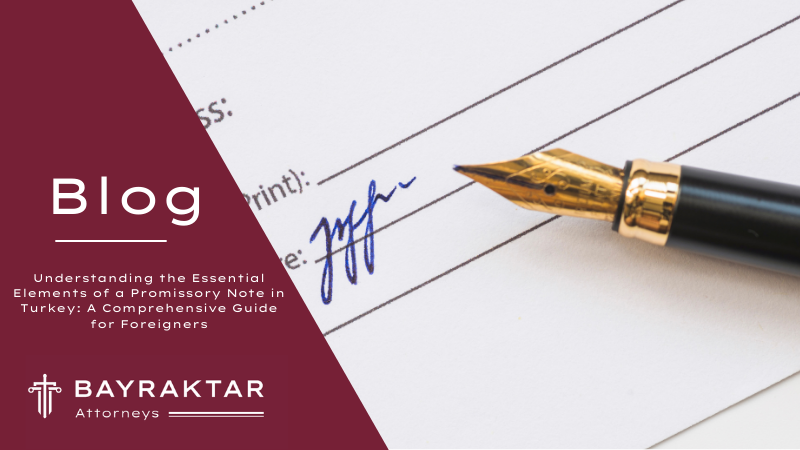
The Turkish legal framework governing financial instruments, such as promissory notes, offers a structured and dependable means of establishing and fulfilling obligations.
Known locally as “senette zorunlu unsurlar,” the essential elements of a promissory note are a fundamental aspect of commercial life in Turkey.
This guide aims to simplify and shed light on these stringent requirements from the perspective of a foreign individual or entity engaging in financial transactions within the nation.
What is a Promissory Note?
A promissory note, or “senet” in Turkish, is a written and unconditional promise made by one party (the payer) to pay a specific sum of money to another party (the payee) either upon demand or at a predetermined future date.
It’s a powerful credit tool and debt instrument that is extensively used in Turkish business transactions. To the foreign eye, it might resemble a standard IOU, but under Turkish law, it holds particular legal formalities that must be taken into account to ensure its enforceability.
Essential Elements of a Promissory Note in Turkey
Under Turkish law, a promissory note must include specific mandatory elements for it to be considered valid and legally binding. These “senette zorunlu unsurlar” protect both the payee and the payer, clarifying the terms of the payment obligation. The principal mandatory elements include:
- The term “promissory note” inserted in the body of the document and expressed in the language of its issuance.
- An unconditional promise to pay a determinate sum of money.
- The name of the party to whom or to whose order the payment is to be made.
- A clear statement of the time of payment.
- The date and place where the promissory note is issued.
- Identity information, including the signature, of the payer (the party who will pay).
Failure to include any of these essential elements may result in a promissory note being rendered invalid and hence unenforceable. This underscores the need for meticulous drafting, particularly for foreigners who may not be familiar with the intricacies of the Turkish legal system.
Legal Aspects Of Promissory Notes In Turkey For Foreigners
Here’s an overview of the legal aspects concerning promissory notes for foreigners in Turkey:
Legal Framework
Promissory notes in Turkey are primarily governed by the Turkish Commercial Code (TCC) and the Code of Obligations. These regulations outline the rules for issuance, transfer, enforcement, and related disputes. Foreigners are subject to the same laws as Turkish nationals when dealing with promissory notes.
Transferability
Promissory notes in Turkey can be transferred via endorsement, making them negotiable instruments. This allows creditors to transfer the debt to third parties. Foreigners can freely transfer or receive such notes, but compliance with local commercial regulations is crucial.
Enforcement and Legal Proceedings
In case of non-payment, the creditor can initiate legal proceedings to enforce the promissory note. Enforcement is typically handled through execution offices (icra dairesi) in Turkey, allowing creditors to seize assets if the debtor fails to pay. The process involves:
- Issuing a payment order.
- Initiating an execution proceeding.
- Potentially seizing the debtor’s assets if payment is not made.
Foreigners and Promissory Notes
Foreign individuals or entities engaging in transactions involving promissory notes should be aware of local legal procedures, language requirements (documents must be in Turkish), and the importance of clear, legally compliant agreements. Foreigners may also need to engage local legal counsel for drafting or enforcing promissory notes to avoid potential legal pitfalls.
Currency and Exchange Regulations
Promissory notes can be issued in foreign currencies, but parties must adhere to currency and exchange regulations in Turkey. For international transactions, exchange rate fluctuations and cross-border enforcement should be carefully considered.
International Enforcement
If the debtor is a foreign national or resides abroad, international treaties like the New York Convention (on arbitration) or bilateral agreements may facilitate enforcement of promissory notes.
Conclusion: Why Accurate Knowledge of Promissory Notes Matters
A well-structured promissory note is a cornerstone of securing and representing credit relationships in Turkey. As international transactions permeate, understanding the essential elements—senette zorunlu unsurlar—of such instruments is vital.
It ensures that your financial dealings are up to par with Turkish statutory standards, thereby safeguarding your interests and promoting smoother commercial engagements within the country.
By educating oneself about these obligations, and seeking the right legal backing, foreigners can confidently navigate Turkey’s financial landscape with ease.
If you require assistance with drafting or understanding promissory notes in Turkey, our team at Bayraktar Attorneys is here to help. We specialize in providing legal guidance to foreign individuals and entities navigating the Turkish legal system, including matters related to financial instruments like promissory notes. Contact us today to discuss your needs and let us provide you with the expert assistance you require for your financial transactions in Turkey.
To know more in depth, take a good look at our “Banking & Finance Law”







